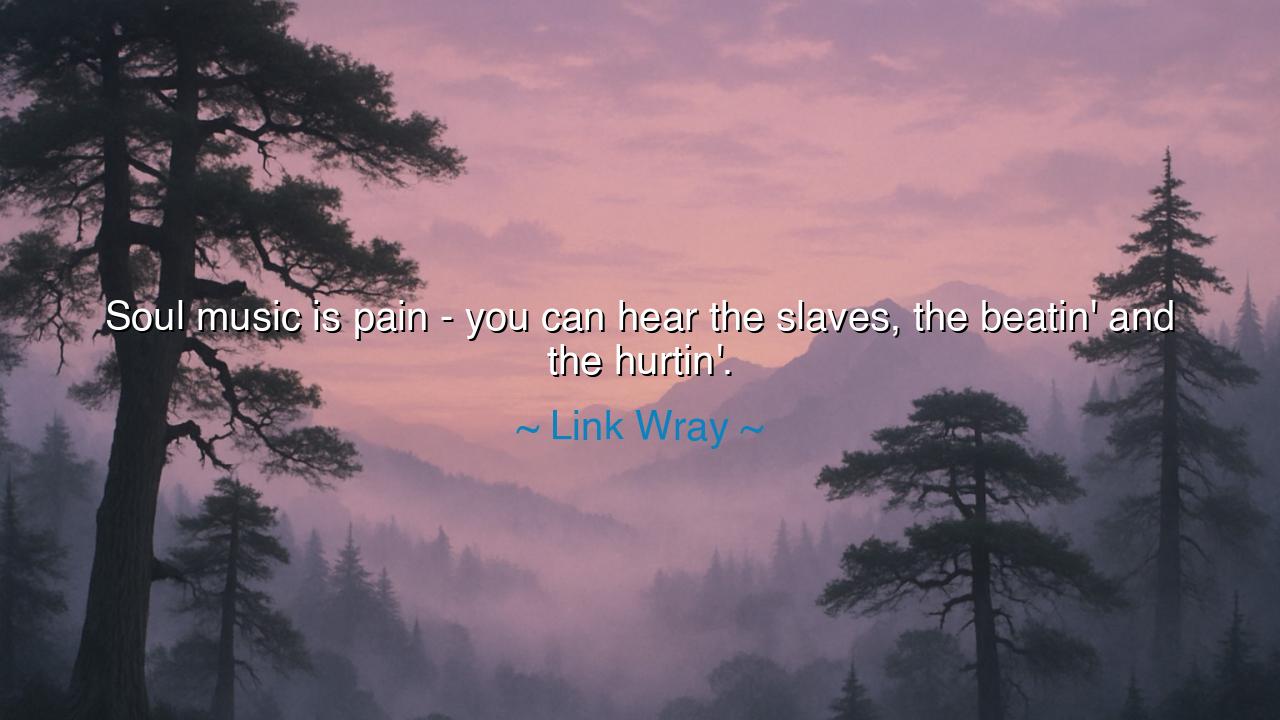
Soul music is pain - you can hear the slaves, the beatin' and






Link Wray, the raw and unyielding voice of rock’s primal roots, once said: “Soul music is pain—you can hear the slaves, the beatin’ and the hurtin’.” These words cut through glamour and pretense, striking at the heart of what true music is: not polished perfection, but the echo of human suffering made into sound. In his reflection lies the wisdom of the ancients—that art is not merely entertainment, but testimony. It carries within it the wounds of the people who birthed it, and through its rhythms, we are invited to remember, to grieve, and to rise.
The origin of soul music is not in concert halls or gilded stages, but in the fields, the churches, and the streets. It was forged in the crucible of slavery, when chains and whips sought to silence the spirit, yet songs rose in defiance. The spirituals, the blues, and later, gospel and soul, carried both lament and hope, both mourning and endurance. When Wray says you can “hear the slaves,” he means that the cries of generations still live in the very notes—the pain is not erased but transformed into power.
History offers us countless witnesses to this truth. Consider the work of Billie Holiday, who sang Strange Fruit. Her haunting voice carried not only her personal sorrow but the collective agony of lynched lives in America. In her trembling tones, the audience could hear the hurtin’ of an entire people. Or think of Sam Cooke, whose anthem A Change Is Gonna Come grew from his own hardship but became the voice of the Civil Rights Movement. These were not songs of frivolity—they were confessions of history, stitched together with melody.
Wray himself was a man of struggle, a Native American in an America that often tried to erase his people’s presence. He understood that music carried the weight of memory. For the oppressed, the rhythm became both a sanctuary and a sword. It was the place where grief was expressed without words, where suffering found release, and where dignity refused to die. When he spoke of soul music as pain, he was honoring its origin as a survival of spirit, the alchemy of sorrow into sound.
The meaning of this quote, then, is both somber and inspiring. It tells us that true art does not come from ease but from endurance. Beauty is often born from the furnace of struggle, and songs that move the heart most deeply are those that carry the tears of generations. Yet in this pain there is also triumph—for every cry that becomes music is no longer voiceless, no longer silenced. In this way, soul music is not only pain—it is the overcoming of pain, the transfiguration of wounds into witness.
The lesson for us is profound: we must not forget the roots of the art we enjoy. To consume soul music merely as entertainment is to dishonor its origin. Instead, let us listen with reverence, remembering the blood, the chains, and the courage that birthed it. Let us also apply this truth to our own lives: when pain comes, do not bury it in silence, but transform it into creation—whether in song, in word, in work, or in service to others. Suffering can destroy, but it can also be redeemed into strength.
Therefore, let each soul carry forward this wisdom. Do not shrink from the memory of past hurts, whether of your people or yourself. Speak them, sing them, make them into something that cannot be ignored. Just as the descendants of slaves created soul music, so too can we turn our private griefs into gifts for others. In doing so, we not only honor those who suffered before us but ensure that their cries are never forgotten.
Thus Link Wray’s words endure: “Soul music is pain—you can hear the slaves, the beatin’ and the hurtin’.” They remind us that music is not escape but memory, not illusion but truth. And when we listen deeply, we are not only hearing songs—we are hearing history, the testimony of survival, and the unbroken spirit of those who refused to be silenced.






AAdministratorAdministrator
Welcome, honored guests. Please leave a comment, we will respond soon